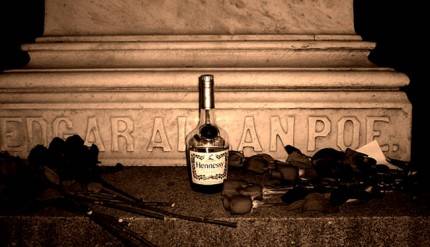The Poe Toaster

The "Poe Toaster"
Beginning in 1949 (or possible somewhat earlier), on the night of the anniversary of Poe’s birth (as January 18th becomes January 19th), a mysterious stranger has entered this cemetery and left as tribute a partial bottle of cognac and three roses on Poe’s grave. (A newspaper article from the Baltimore Sun in 1950 includes a minor mention of the visitor leaving such items, conclusively documenting that it began at least in 1949.) Although some early members of the church recalled in the 1970s that it may have started in the 1930s, the year 1949 is more widely accepted, and the date of 1949 would be significant as the 100th anniversary of the year Poe died. The identity of the stranger, referred to affectionately as the “Poe Toaster,” is unknown. The significance of cognac is uncertain as it does not feature in Poe’s works as would, for example, amontillado. The presumption for the three roses is that it represents the three persons whose remains are beneath the monument: Poe, his wife (Virginia Clemm Poe), and his mother-in-law (Maria Clemm). Out of respect, no attempt is made to stop or hinder him. Several of the bottles of cognac from prior years are kept at the Baltimore Poe House and Museum.
A note left in 1993 stated somewhat cryptically that “the torch will be passed,” and another note left in 1999 indicated that the original “Toaster” had died within a few months before the annual event. After 1993, sightings of the visitor suggested two younger persons were exchanging the obligation between themselves, presumably in honor of their father. The annual visitations continued through 2009, the bicentennial of Poe’s birth, but not in subsequent years. On January 19, 2012, after three successive years in which there was no appearance from the “Toaster,” it was officially declared that the original tradition had ended. Various individuals have taken it upon themselves to leave similar tokens, and some have hoped that they might be able to assume the same recognition and continue the tradition, although they have generally been referred to somewhat dismissively as “Faux Toasters.” As there is no authoritative body other than the person who appears to have originated the tradition, and those he has designated, and no such transfer of authority has occurred, all such attempts to restart a new tradition must be taken purely on their own merits.
Information from http://www.eapoe.org/balt/poegrave.htm